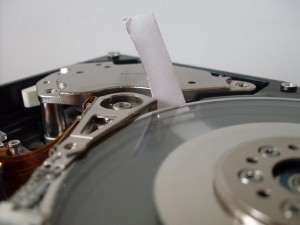March 31st is World Backup Day. It’s sponsored by a number of companies, and as you might expect, all of those sponsors offer some type of product or service related to data backup.

A hard drive with severely damaged platters.
But with that said, we appreciate any opportunity to broadcast the importance of data backup. Our laboratories frequently receive cases from clients who swear that they’d made a copy of their family pictures, manuscripts, and other important files — but when their hard drive or solid-state drive failed, they realized that the backup was missing or incomplete.
According to the World Backup Day website, 21% of people have never made a backup. Other statistics are even more startling: Backblaze’s 2022 Backup Survey reports that only 10% of respondents had daily backups, while 26% acknowledged that they only backed up their data once per year.
Put simply, if you’re not backing up your files, they’re at risk. Here are a few simple ways to protect your mission-critical data.
Keep at least two data backups, including one off-site copy.
A single backup is good, but two backups are much, much better.
Certain data loss scenarios may damage all of your media. A flood, tornado, or even a malware infection could render a single backup useless. By keeping at least one copy offsite, you can get a much higher level of protection.
Cloud backup services are an excellent option. We also recommend keeping a separate local backup — while cloud services are extremely reliable, any system can lose data, period. You might lose your password for a cloud service or have trouble with another type of authentication method; if you need to restore data quickly, every second counts.
Related: Should I Use Cloud Storage or an External Drive for Data Backup?
Take human error out of the equation.
You can use backup software and cloud storage software to fully automate your backups. That’s key to a strong strategy: When backups are automatic, you don’t need to think about them as frequently.
With that said, you should still check your automated backups occasionally (as we’ll discuss below). You might also consider creating regular “golden copy” backups that are stored offline: This can provide protection from ransomware attacks and other types of malware infections.
Related: 6 Data Backup Mistakes That Increase Your Risk of Data Loss
Check your backups regularly.
Many of our clients make backups, but when a media failure occurs, they realize that their backups are missing some important files. In some cases, the data is corrupt or unreadable — or the backup device fails at the same time as the primary drive (this is especially common for data loss scenarios caused by power surges, fires, and other natural disasters).
We recommend running regular tests to ensure that you’re prepared for a data loss event.
Load your backups and ask questions:
- Is my backup recent enough to be useful?
- Does my backup contain all of the important files that I need?
- Can I open, view, and use the files?
If you answer “no” to any of those questions, you need to re-think your strategy.
Related: Why People Don’t Back Up Their Data
If data loss occurs, don’t panic.
Nobody’s perfect, and if you’ve forgotten to back up your data, you’re certainly not alone. However, the steps you take following a data loss event will significantly impact your chances of a full recovery.
Some quick tips:
- If a device fails due to physical issues (such as hard drive head crash), data recovery software will not fix the underlying problem. Running software can damage your media, causing permanent data loss.
- Work with a qualified provider. Data recovery laboratories have cleanrooms and other specialized equipment — most computer repair shops do not have the necessary resources to attempt recovery.
- Keep your device powered off. Hard drives, NAND flash media, and other data storage devices write data frequently while operating. Powering down your media ensures the best chance of a successful case result.
If you’ve lost data from a hard drive, SSD, or any other type of device, we’re here to help. Datarecovery.com provides a no data, no charge guarantee, along with free media evaluations for most types of storage media.
To learn more, call us at 1-800-237-4200 or submit a case online.





